Asia & Oceania
The 50 Greatest Welterweights of all Time. Part One: 50-41

50 Greatest Welterweights – I was surprised to find that the welterweights were not as stacked as the middleweights. There was a squabble among around twenty fighters for the eight spots between fifty and forty-three and the sense that there was a “truth” to my eventual selections is absent. The bottom eight presented here could easily be comprised of eight different fighters as it was the narrowest slivers that separated these men from the fighters who didn’t make it, and smaller differences that separate them from each other. Looking now at numbers forty-nine and fifty, I know that Gaspar Ortega and Don Jordan probably have as strong a case as Simon Brown and Ike Quartey.
So conclusion one is that the middleweight division is deeper than the welterweight division, but it is also true that at no time during this project, which has seen ATG lists produced for light-heavyweight and heavyweight as well as middleweight, have I had so much fun crunching footage. Watching the welterweights has been sheer joy. Breaking down a fighter’s career on film can become a chore because not all fights are equally entertaining and many are being re-visited, but watching the great welterweights has been a deep joy from beginning to end. So although, in a sense, welterweight compares negatively to middleweight, in another it compares mightily – and unquestionably runs deeper than light-heavyweight.
The boring stuff: this is not a head to head list. This is a composite list which tries to draw influences from all the traditional criteria for ranking of which head to head is only a small part. Achievements, defenses of the legitimate title, dominance over opposition or even an era, opposition bested, longevity, troubling losses and skillset on film are all more important to me than the imagined outcome of fights between fighters who never met. This has to be the case when comparing fighters who fought more than 100 years apart and in considering fighters who I have never seen box. In these instances, reading replaces watching as we try to piece together the careers of fighters who fought in a more shadowy ring than the one under the blazing lights of the color television era.
With that out of the way…
…this, is how I have them:
#50 – Simon Brown (47-12)
Simon Brown’s competition for the #50 spot was deep and varied. Fighters considered for the low spot on the high mountain included two-time champion Matty Matthews, his storied contemporary, Honey Melody, the mercurial Ceferino Garcia and unlucky #51, Tony DeMarco. The inconsistency of these men let Brown slip in the back door to the top fifty, a door he now minds as the gatekeeper to history.
Beaten twelve times in his career, Brown lost only twice at the 147lb weight limit, to the wonderful Marlon Starling, having boxed barely twenty fights, and to the superb Buddy McGirt in the fight that signaled the end of his title reign and of his time in the welterweight division. Humble, pious, respectful and concentrated outside the ring, Brown verged on the legitimately menacing inside it, a stalker who exhibited a savagery that often transgressed the bounds of what is acceptable in the ring, a thumping pressure-fighter who became legitimately frightening when he smelled blood.
He picked up an alphabet strap for the first time early in 1988, taking on the capable Tyrone Trice for the trinket in question. Trice had as much heart as can be crushed into a 147lb frame although he had more room than most to spread that poundage, being a welterweight of large dimensions. Both men took to the pocket early to attempt to dominate one another but it was the bigger Trice who forced Brown back – but this is important to note. Brown was not a one-trick pony; he went on the move after Trice dropped him with a left-hook and a bowling-ball right landed up above the ear in the second. Brown bided his time, finally won a round in the sixth, and never looked back. By the thirteenth, Trice was drunkenly staggering around the ring looking for the exit and in the fourteenth it was deemed the judges would not be needed. Their rematch was a one-sided brutalization.
Brown defended that strap on numerous occasions, but far more important was his general standing within his division during that time. He was ranked by Ring as one of the six best welterweights in the world for an outstanding eight consecutive years. By the time of his 1991 meeting with one of his closest friends, Maurice Blocker, he was probably past his very best but this fight, depending upon your point of view, was either a battle to crown a new lineal welterweight champion or an alphabet unification bout. Whatever the details, Blocker had the long jab and intelligence to trouble Brown and did; Brown found him, whilst behind on the cards, in the twelfth but eschewed all notes of triumph until he had consoled his friend, whom he broke in the tenth.
Former world champion Jorge Vaca was yo-yoed off the canvas like a journeyman in 1988 and there ends the significant portion of Brown’s ledger. A gifted body-puncher with a fantastic chin, superb infighting ability both on offense and defense, he also had a quality engine. Bordering upon the monstrous over the fifteen round distance, he was nevertheless an excellent twelve round fighter and although his inclusion here can be argued, as can the last name on almost any list, I think he’s good for it.
#49 – Ike Quartey (37-4-1)
Heavy-handed, disciplined and armed with a priceless and unerring accuracy, Ike Quartey, out of Ghana, was a handful for anyone, as he proved in stretching the unbeaten Oscar De La Hoya to the absolute limit in 1999, arguably having slipped past his own prime. This fight was Quartey’s date with destiny and he failed, by a hair’s breadth, both on my scorecard (I had it 114-113, De La Hoya triumphing by virtue of a twelfth round knockdown) and on the judge’s, where he dropped a split decision. Nevertheless, it is not difficult to find fight fans who believe De La Hoya was lucky to be awarded this decision; suffice to say that Quartey’s career would have been very different had he edged this one.
His best performance, the one that most defines him for me, was his eleventh round knockout of Crisanto Espana from five years earlier, a fight in which he picked up his alphabet strap. 30-0 when he made his date with Quartey, Espana has become severely underrated since his mid-nineties pomp, when his combination of work-rate, aggression and self-control made him a formidable opponent. So formidable that when the eleventh began, and Quartey put Espana on the slab, I had the Venezuelan ahead; a crafty and capable boxer, Quartey’s insistence and power made those cards redundant with impressive and sudden violence. It is a fight worth seeing.
A foul-filled battle with Oba Carr, oddly rendered a split-decision in a fight I thought Quartey won clearly and a raucous knockout of the dangled Vince Phillips, a true showcase of accuracy in the finish, were other fine highlights of a fine career that perhaps wasn’t all it could have been.
#48 – James McGirt (73-6-1)
Buddy McGirt’s wider resume is rather good but his 19-2 at welterweight was less than overwhelming with a lot of filler and few ranked fighters. He sneaks in here in the main by virtue of his wonderful 1991 win over Simon Brown, who ranks at #50. This was an absolute masterclass against an opponent used to steaming down the straight but who was instead firmly mastered in those later rounds based upon the surety of McGirt in his own stamina, a surety born of discipline. McGirt was able to take all opportunities to punch against Brown that he could see and many that he engineered, including a sizzling right-uppercut left hook combination that really he had no business landing against a quality opponent. McGirt made Brown gun shy, a phenomenal achievement, then he knocked him down and took his title in a near whitewash (I gave Brown two rounds).
The second defense of that title against Mexican banger Genaro Leon was another masterclass (at least until the tired, ragged twelfth), all the more impressive due to McGirt having damaged his left shoulder in training, hampering his best punch, the left hook – but it is for his losses to Pernell Whitaker that McGirt will be most fondly remembered. Losses rarely enhance a fighter’s standing in my eye but the first Whitaker fight was probably an exception; McGirt went in without that wonderful left hook due to the injury to his shoulder that bothered him against Leon and although Whitaker eventually solved and dominated him, he out-boxed the great Sweet Pea early with technically sure in-fighting.
Some will want to see McGirt higher and I understand why. At his best, he was brilliant. But his matchmaking was uninspired in the extreme. He crossed paths with very few top welterweights and although his first fight with Whitaker was an incredible effort, the second was a one-sided thrashing. Mythical factors might drive McGirt up the list a little but in terms of what he actually did, he probably doesn’t belong among The Fifty – the way he did it gets him just inside the line.
#47 – Benny Paret (35-12-5)
Too inconsistent to rank any higher, Benny Paret’s tragically short career was heavily sprinkled with losses and draws, but he nevertheless represents a step up from the level at which McGirt’s competition maroons him. He met an extraordinary run of competition beginning in 1959 with the first of his two back-to-back duels with top contender Charley Scott.
Scott, a lithe and compact technician capable of both the sublime and the ridiculous, stood a heavy favorite over Paret; even after Paret out-classed and dropped him he was made a 3-1 dog in their second fight forty-two days later. Paret dished out another beating only to have the experienced Luis Federico Thompson thrown down between him and a title shot; a drawn contest in which Paret likely deserved the barest of nods was the result, a result Paret converted into a win in their rematch. By that time, he was the world welterweight champion having ripped the title from Don Jordan, an inconsistent king who was ready to be taken. Paret did so utilizing fast, busy hands and quick, organized footwork to get down the straight and scoop up the title after fifteen.
Even then, in his peripheral vision, Paret might have caught sight of the great Emile Griffith who now began to stalk Paret and his title with tragic consequences. The two met for the first time on the occasion of Paret’s second title defense in April of 1961 in a crowded, unsatisfactory affair that was poised evenly at the bell for the thirteenth round, whereupon Griffith found a rare and deadly combination to end the affair. Some hearts are not for breaking though, and Paret came again in September of that same year and took back his title, winning a split after fifteen.
Paret, possibly, did not deserve this decision. It was a wonderful fight of ebbs and flows and Paret showed bravery and quick hands and a quicker mind in the middle rounds to steal those frames and at least give the judges a reason to find for him. Would that the judges had found against him; Paret’s victory meant a rubber match became necessary and in that third contest, Griffith killed Paret in the ring with his punches.
More famous for being beaten to death on live television than anything he did in his mercurial career, there were the bones of a great fighter here who deserves recognition as something more than just boxing’s most famous corpse.
#46 – Vernon Forrest (41-3)
Vernon Forrest earned the #46 spot basically by besting one man on two separate occasions, the then pound-for-pound #1 and world welterweight champion Shane Mosley. Mosley was courting, when he met with the unassuming, unheralded Forrest for the first time, justification of his adoption of the nickname “Sugar.”
Forrest undid that prospect and in the first fight he did it in so dominant fashion that it led to Forrest himself being labelled one of the best fighters in the world, summiting at #3 on Ring’s pound-for-pound list. As is so often the case, Forrest was lauded for his offense in a winning effort but it was a defensive punch, the right uppercut employed when Mosley gained the inside, which was often crucial. Clinching played its part too, as it did in the rematch, won more narrowly on the cards than the first fight but won nonetheless.
Solid and unspectacular, Forrest’s limitations were exposed by the marauding Ricardo Mayorga who blasted him from the pound-for-pound list in three rounds in their first fight and narrowly out-pointed him in their second. Balance disrupted and apparently intimidated, Forrest looked anything but a fighter who belongs on an all-time list of whatever length, but the status of his victim on the two best nights of his career nudge him in ahead of more assured looking performers.
The 50 Greatest Welterweights of all Time. Part One: 50-41
#45 – Jack Carroll (85-11-4)
It is probable that even some hardcore Sweet Science readers will not have heard of Jack Carroll, despite an astonishing thirty fight unbeaten streak that stretched from 1932 to 1938; on the other hand, there will be a small kernel of readership denouncing me for ranking him this low. Carroll was an Australian who never left his home continent and so has been abandoned slightly by a history written mainly by America.
Carroll’s style was the very definition of ugly, encompassing cuffing, slapping and lacing but he also had an intuitive grip of the angles of pugilism and a floaty, whipping left. His crab-like ringcraft led to comparisons with Bob Fitzsimmons but that comparison was born of style alone; Carroll’s left was more hummingbird than scythe and he was not much more dangerous with his right. But he was terribly difficult to catch clean and adept at piling up points.
Despite the oddities of his execution, Carroll is likely the most beloved boxer in the history of his country’s considerable pugilistic history. Tens of thousands turned up to watch him improvise his way through the best imported fighters that money could buy, and although this never included champion Barney Ross, Carroll probably established himself as one of Ross’s finest contenders in beating ranked men like Jimmy Leto (three times), Izzy Jannazzo, Bep Van Klaveren (twice), Jack Portney and Willard Brown.
One might argue that Carroll should have left Australia for Britain and then America but Carroll knew his limitations. He retired, apparently upon medical advice and “on the verge of a nervous breakdown.” Home was where he remained, financially secure, professional satisfied and the hero of his countrymen.
#44 – Joe Dundee (86-22-11; Newspaper Decisions 6-1-1)
Joe Dundee was not a great champion. Although he held the title for just over two years between 1927 and 1929 before losing it to Jackie Fields on a disqualification, in that time he fought a single dubious defense and lost numerous non-title matches.
What scrambles Dundee over the line and onto the top fifty where so many champions with similarly questionable reigns do not is his pre-title run. Moving up from lightweight, he burgled title contendership from Jack McVey, Tommy Freeman and finally Willie Harmon all within the first five busy months of 1926. It was a narrow thing against Harmon who somewhat neutralized Dundee’s offense early before the Baltimore lad, who had been born in Italy, burst open in the final four rounds of their ten round contest. This was typical of Dundee who enjoyed no extraordinary physical attributes outside of his engine, which ground out victories born of a steeltrap mind and a focus of purpose.
He successfully stalked and even stopped one Mickey Walker, too, just days after that victory over Harmon. The great Walker carried an old wound to the ring and Dundee capitalized mercilessly, the referee stopping the fight in the eighth with the former champion “practically blinded” by blood according to the Universal Service. Dundee dominated that fight, losing perhaps only the first round and while the temptation is to name Walker past-prime, it is worth noticing that the “Toy Bulldog” still had the middleweight and light-heavyweight championship of the world in his future.
Dundee won his title shot over Pete Latzo at a canter, although one judge somehow found a draw, rendering it a majority decision. In truth, Dundee had outclassed the incumbent champion with pressure and work without fanfare or drama. So began his ignoble reign, barracked by the old fashioned grit that saw him rise to the top.
#43 Dave Shade (132-28-59; Newspaper Decisions 24-1-1)
Dave Shade turned professional at the end of World War One and boxed all the way to the cusp of World War Two, and for the entirety of his career he was matched hard and often – the man lived to be eighty-one years old. He had the innate toughness of the inanimate but in the ring preferred the rule of perpetual motion to that of inertia, bobbing, weaving, and boring in.
Shade’s wonderful durability, fine jab, and slippery inward trajectory made him a force against even light-heavyweights, but it was at 147lbs that he came nearest to making his championship mark, twice holding veteran welterweight demi-god Jack Britton to a draw. He was lucky, perhaps, to gain the second but may have been unlucky not to have received more from the first after dropping the demi-god sharply on his behind and pressing him all the way.
Shade himself identified not those desperate draws with Britton as his toughest, however, but rather his three encounters with the toy bulldog, Mickey Walker. One can imagine that it would be reasonable for Shade simply to curse his luck at finding himself strapped between the reigns of first Britton and then Walker but Shade, instead, got on with the job of trying to beat the man – and he did just that.
Shade lost his first 1921 encounter with Walker when he was forced to retire with a hand injury but took the newspaper decision when the two met in a rematch four weeks later. When Walker successfully dethroned Britton, Shade was a natural for a shot at the title, but it was Walker who took the controversial split-decision victory.
Shade had a way of reaching into the jeweler’s purse and coming up with a turd, as was the case when he met with Jimmy Jones in defense of the alphabet belt he was awarded in the boardroom for all that he couldn’t gain one in the ring, unexpectedly losing despite twice dropping Jones in the early rounds. In a way it summarized a career of one of the division’s great nearly men.
#42 – Paddy Duffy (33-3-21)
Paddy Duffy is generally credited as being the first welterweight champion. He claimed the title in earnest in 1888 after his one-sided destruction of teak-tough Scotsman Billy McMillan, Britain’s premier welterweight, who he handled with no great tenderness for a total of seventeen rounds. A “soft glove” match with Charles Gleason became his first defense by default when the Englishman gave the champion a fright in what was little more than an exhibition – but this confrontation was dwarfed by the epic forty-five round war Duffy staged with contender Tom Meadows in 1889.
Meadows, out of Sydney, Australia, had rocked his way through the best his country had to offer and had remained undefeated throughout his 1888 campaign in America. He boxed cautiously early against Duffy, trying to take the sting out of the champion’s rushes by boxing and moving but he found himself up against it in his commitment to this strategy; Duffy was relentless as the tide, storming the Meadows barricade and drawing blood from his ear as early as the second. Speed of pressure seemed Duffy’s greatest weapon and he reportedly came close to dropping his foe in the third with a left, his more prestigious appendage. It was the twelfth, however, before Meadows felt safe enough to stand his ground and fight. By the 24th the heat had been drawn from the fight by a foggy balm, but Duffy, as he always did in his prime, proved the harder man. At bottom, it was that simple for him – he outlasted and out-gamed the sheetrock tough Australian and by the end of the fight was sending him to the canvas with sickening regularity.
Meadows fouled out, launching himself bodily at his tormentor, disqualified for head butts as the two tangled on the canvas.
Tragically, Duffy was claimed by tuberculosis the following year, aged just twenty-five and in his absolute prime. One imagines his inability to out-last even this terrible foe came as something of a surprise.
#41 – Young Jack Thompson (79-31-10)
To say that Jack Thompson has been handed the benefit of the doubt by history is hardly to stretch a point. Named “one of the finest performers the ring has ever known” by Nat Fleischer, Cyber Boxing Zone bemoans the “outright robberies” he suffered in explaining some of his thirty-one losses. They name, in particular, his “highly controversial” ten round non-title fight defeat to Lou Brouillard as being questionable. This is nonsense; the decision was just. The Associated Press noted that Brouillard defeated Thompson by “a wide margin” and that he was “much too strong” for Thompson; indeed, in the rematch a few months later for the welterweight championship, Brouillard thrashed him. Thompson’s status as victim has, probably based upon Nat Fleischer’s admiration for him, been exaggerated.
There were questionable decisions – such as his ten round loss to the great Jimmy McLarnin, a fight that probably could have gone either way (many ringsiders gave it to Thompson, but there are cards for McLarnin, who broke his hand in the first round), but then there was his handy defeat by Bucky Lawless, a fight in which he was protected from the loss of his title by his insistence that Lawless come in a pound over the championship weight. There are swings and roundabouts in Thompson’s career, one that is rather typical of a mercurial talent unable to equalize his brilliance with consistency. Sure, there were decisions he perhaps should have received – including a crucial one – but not 31 of them.
For all that, Thompson was a man of true significance in the welterweight picture of the 1920s and early 1930s. He came to real prominence in destroying reigning welterweight champion Joe Dundee in a non-title fight, obliterating him in just two rounds. After some more impressive wins he ran into Jackie Fields who twice defeated him before he took his revenge in a title match in May 1930, a brilliant, dominant performance by Thompson over a great champion. But he dropped the title in his first defense, to the scrapper Tommy Freeman in a probable robbery, the most significant and unquestioned “questionable decision” of his career; Thompson reclaimed the title a few weeks later in a brutal battering of the same man.
There were other good nights and other bad, including his third loss to Young Corbett III who cleanly defeated Thompson twice (their first fight possibly should have been scored a draw). A very fine fighter, and legitimately among the top fifty of this division’s rich history, neither the historical standing foisted upon him by Fleischer, or his “honorable mention” for the IBRO top twenty welterweights of all time sits particularly well with me.
Check out the latest news and videos at The Boxing Channel
Argentina
The BWAA Shames Veteran Referee Laurence Cole and Two Nebraska Judges
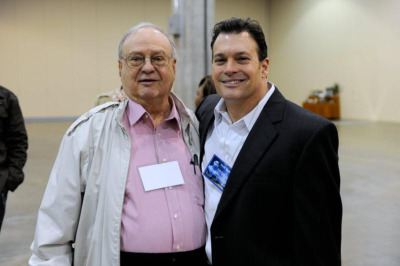
In an unprecedented development, the Boxing Writers Association of America has started a “watch list” to lift the curtain on ring officials who have “screwed up.” Veteran Texas referee Laurence Cole and Nebraska judges Mike Contreras and Jeff Sinnett have the unwelcome distinction of being the first “honorees.”
“Boxing is a sport where judges and referees are rarely held accountable for poor performances that unfairly change the course of a fighter’s career and, in some instances, endanger lives,” says the BWAA in a preamble to the new feature. Hence the watch list, which is designed to “call attention to ‘egregious’ errors in scoring by judges and unacceptable conduct by referees.”
Contreras and Sinnett, residents of Omaha, were singled out for their scorecards in the match between lightweights Thomas Mattice and Zhora Hamazaryan, an eight round contest staged at the WinnaVegas Casino in Sloan, Iowa on July 20. They both scored the fight 76-75 for Mattice, enabling the Ohio fighter to keep his undefeated record intact via a split decision.
Although Mattice vs. Hamazaryan was a supporting bout, it aired live on ShoBox. Analyst Steve Farhood, who was been with ShoBox since the inception of the series in 2001, called it one of the worst decisions he had ever seen. Lead announcer Barry Tompkins went further, calling it the worst decision he has seen in his 40 years of covering the sport.
Laurence Cole (pictured alongside his father) was singled out for his behavior as the third man in the ring for the fight between Regis Prograis and Juan Jose Velasco at the Lakefront Arena in New Orleans on July 14. The bout was televised live on ESPN.
In his rationale for calling out Cole, BWAA prexy Joseph Santoliquito leaned heavily on Thomas Hauser’s critique of Cole’s performance in The Sweet Science. “Velasco fought courageously and as well as he could,” noted Hauser. “But at the end of round seven he was a thoroughly beaten fighter.”
His chief second bullied him into coming out for another round. Forty-five seconds into round eight, after being knocked down for a third time, Velasco spit out his mouthpiece and indicated to Cole that he was finished. But Cole insisted that the match continue and then, after another knockdown that he ruled a slip, let it continue for another 35 seconds before Velasco’s corner mercifully threw in the towel.
Controversy has dogged Laurence Cole for well over a decade.
Cole was the third man in the ring for the Nov. 25, 2006 bout in Hildalgo, Texas, between Juan Manuel Marquez and Jimrex Jaca. In the fifth round, Marquez sustained a cut on his forehead from an accidental head butt. In round eight, another accidental head butt widened and deepened the gash. As Marquez was being examined by the ring doctor, Cole informed Marquez that he was ahead on the scorecards, volunteering this information while holding his hand over his HBO wireless mike. The inference was that Marquez was free to quit right then without tarnishing his record. (Marquez elected to continue and stopped Jaca in the next round.)
This was improper. For this indiscretion, Cole was prohibited from working a significant fight in Texas for the next six months.
More recently, Cole worked the 2014 fight between Vasyl Lomachenko and Orlando Salido at the San Antonio Alamodome. During the fight, Salido made a mockery of the Queensberry rules for which he received no point deductions and only one warning. Cole’s performance, said Matt McGrain, was “astonishingly bad,” an opinion echoed by many other boxing writers. And one could site numerous other incidents where Cole’s performance came under scrutiny.
Laurence Cole is the son of Richard “Dickie” Cole. The elder Cole, now 87 years old, served 21 years as head of the Texas Department of Combat Sports Regulation before stepping down on April 30, 2014. At various times during his tenure, Dickie Cole held high executive posts with the World Boxing Council and North American Boxing Federation. He was the first and only inductee into the inaugural class of the Texas Boxing Hall of Fame, an organization founded by El Paso promoter Lester Bedford in 2015.
From an administrative standpoint, boxing in Texas during the reign of Dickie Cole was frequently described in terms befitting a banana republic. Whenever there was a big fight in the Lone Star State, his son was the favorite to draw the coveted refereeing assignment.
Boxing is a sideline for Laurence Cole who runs an independent insurance agency in Dallas. By law in Texas (and in most other states), a boxing promoter must purchase insurance to cover medical costs in the event that one or more of the fighters on his show is seriously injured. Cole’s agency is purportedly in the top two nationally in writing these policies. Make of that what you will.
Complaints of ineptitude, says the WBAA, will be evaluated by a “rotating committee of select BWAA members and respected boxing experts.” In subsequent years, says the press release, the watch list will be published quarterly in the months of April, August, and December (must be the new math).
Check out more boxing news on video at The Boxing Channel
Canada and USA
In Boxing, the Last Weekend of July was Chock Full of Surprises
The first upset of last weekend occurred in an undercard bout on the big show at London’s O2 Arena. David Allen, a journeyman with a 13-4-2 record, knocked out previously undefeated
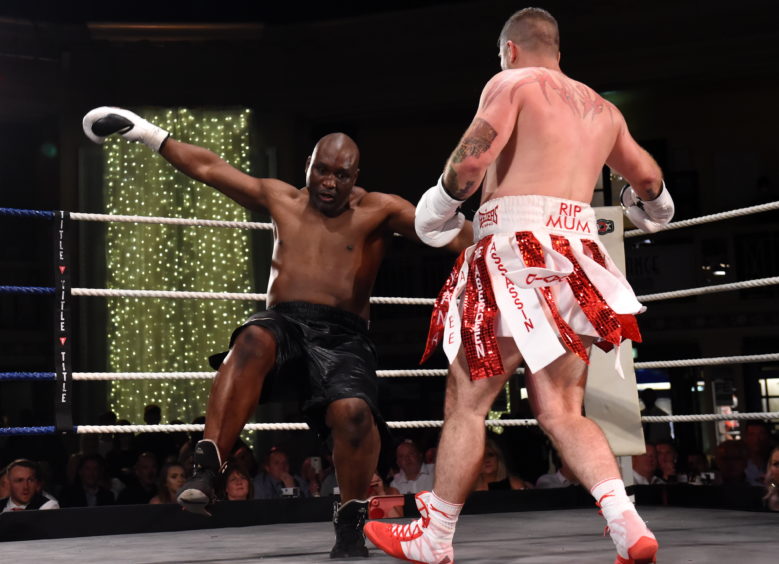
The first upset of last weekend occurred in an undercard bout on the big show at London’s O2 Arena. David Allen, a journeyman with a 13-4-2 record, knocked out previously undefeated Nick Webb (12-0, 10 KOs) in the fourth round. Allen said that he intended this to be his final fight, but will now hang around awhile.
In hindsight, this was an omen. Before the show was over, upsets – albeit mild upsets – were registered in both featured bouts. Dereck Chisora, trailing on the scorecards, stopped Carlos Takam in the eighth. Dillian Whyte outpointed Joseph Parker. And later that same day, in Kissimmee, Florida, Japanese import Masayuki Ito made a big splash in his U.S. debut, beating up highly touted Christopher Diaz.
– – – –
Joseph Parker is quite the gentleman. Following his loss to Dillian Whyte, Parker was gracious in defeat: “I say congratulations to Dillian. I gave it my best. The better man won.”
In case you missed it, Whyte survived a hoary moment in the final round to win a unanimous decision. Most everyone agreed that the decision was fair but there were a few dissenters. Well known U.K. boxing pundit Steve Bunce said, “I thought Parker deserved a draw.” Bunce noted that the scribes sitting near him were in complete accord that the most lopsided score (115-110) was far too wide.
We’ve seen fighters grouse that they were robbed after fights that were far less competitive. Parker’s post-fight amiability was all the more puzzling considering that he had a legitimate beef that referee Ian John Lewis was too lax, enabling Whyte to turn the contest into a street fight.
Parker’s trainer Kevin Barry was all on board with the selection of Lewis. “He’s a very highly qualified guy who I think is the best British referee,” he said. But Barry changed his tune after the fight, saying that there were at least two occasions when Lewis should have deducted a point from Whyte.
Veteran Australian boxing writer Anthony Cocks said that going forward, Parker, a soft spoken, mild mannered man, needs to have more of a mongrel in him. Cocks noted that when Whyte transgressed, Parker’s response was to look at the ref with a bemused expression. The first time that Whyte bent the rules, opined Cocks, Parker should have hit him in the balls.
– – – –
Top Rank hasn’t had much luck with their Puerto Rican fighters lately. First there was Felix Verdejo. Hyped as the next Felix Trinidad, the 2012 Olympian was 22-0 when his career was interrupted by a motorcycle accident. He won his first fight back in Puerto Rico, but was then exposed by Tijuana’s unheralded Antonio Lozada Jr. who stopped him in the 10th round at the Theater of Madison Square Garden on St. Patrick’s Day, 2018.
More recently, Top Rank gave a big build-up to Christopher Diaz, but Diaz, the 2016 ESPN Deportes Prospect of The Year, also hit the skids after starting his pro career 23-0. Diaz was upset on Saturday by Masayuki Ito in a match sanctioned for the vacant WBO 130-pound title.
Unlike Verdejo, Diaz was still standing at the final bell, but he was taken to the cleaners by his Japanese opponent who won comfortably on the scorecards.
– – – –
Russia’s Vladimir Nikitin made his pro debut on the Diaz-Ito undercard. Nikitin won every round of a 6-round contest.
If the name sounds vaguely familiar, this is the guy who defeated top seed Michael Conlan in a quarterfinal bantamweight match at the Rio Olympics. The decision, which Conlan greeted with a middle finger salute to the judges, was widely seen as a heist.
In signing new prospects, Top Rank honcho Bob Arum likes to gather up fighters who compete in the same weight class as fighters that he already controls. This sets up a scenario where he can double dip, extracting a commission from the purse of both principals.
The cluster is most pronounced in the lower weight classes. These fighters, listed alphabetically, are currently promoted or co-promoted by Top Rank: junior bantamweight Jerwin Ancajas (31-1-1), junior featherweight Michael Conlan (8-0), featherweight Christopher Diaz (23-1), super bantamweight Isaac Dogboe (19-0), super bantamweight Jessie Magdaleno (25-1), super bantamweight Jean Rivera (14-0), featherweight Genesis Servania (31-1), bantamweight Shakur Stevenson (7-0), bantamweight Antonio Vargas (7-0), featherweight Nicholas Walters (26-1-1).
The aforementioned Nikitin launched his pro career as a featherweight.
– – – –
In July of 2004, Danny Williams knocked out Mike Tyson in the fourth round at Louisville. Iron Mike had one more fight and then wisely called it quits. Williams had 48 more fights, the most recent coming last weekend in Aberdeen, Scotland.
Williams was stopped in the 10th round by a local man, 35-year-old Lee McAllister, whose last documented fight had come in 2013. In that bout, McAllister, carrying 140 pounds, outpointed a Slovakian slug in a 6-round fight. During his hiatus from boxing, McAllister (that’s him in the red and white trunks), served a 9-month prison sentence for assaulting a patron while working in an Aberdeen kebab shop.
Danny Williams’ weight wasn’t announced, but in his three fights prior to fighting McAllister he came in a tad north of 270 pounds. He reportedly out-weighed McAllister by 4 stone (56 pounds), likely a loose approximation.
Williams is a product of Brixton, the hardscrabble Afro-Caribbean neighborhood in South London that also spawned Dillian Whyte. But he has no intention of going back there. After the McAllister fight, in which he was knocked down three times, he said he was retiring to Nigeria where he had a job waiting for him as a bodyguard.
– – – –
The ink was barely dry on the weekend’s events when news arrived that Tyson Fury was close to signing for a December bout with WBC heavyweight titlist Deontay Wilder. On social media, Fury said the deal was almost done and Fury’s promoter Frank Warren confirmed it while saying that it was conditional on Fury looking good when he opposes Francesco Pianeta on Aug. 18 at the Windsor Park soccer stadium in Belfast. Fury vs. Pianeta underpins Carl Frampton’s WBO featherweight title defense against Luke Jackson.
As to whether he would be ready to defeat Wilder after only two comeback fights, Fury, who turns 30 this month, said he was ready to beat Wilder on the day he was born.
Deontay Wilder is disappointed that his dream match with Anthony Joshua won’t happen until next spring at the earliest, but there are plenty of options out there for him and more of them for him to ponder after this past weekend’s events.
Cuban southpaw Luis Ortiz looked good against Razvan Cojanu, dismissing his hapless Romanian adversary in the second round on the Garcia-Easter card in Los Angeles.
After the bout, WBC prexy Mauricio Suliaman gave Wilder his blessing to skirt his mandatory against Dominic Breazeale for a rematch with Ortiz.
Presumably that also applies if Wilder accepts promoter Eddie Hearn’s offer for a match with Dillian Whyte. The WBC now lists Whyte as their “silver” champion and has bumped him ahead of Breazeale into the #1 slot in their rankings. And then there’s Jarrell “Big Baby” Miller who has an Eddie Hearn connection and is a more interesting opponent than Breazeale.
If Wilder vs. Fury is a go, say Fury and Warren, it will be held in December in New York or Las Vegas. We make New York the favorite. The only good date in Las Vegas in December for an event of this magnitude is Dec. 1 and that’s only because Thanksgiving arrives early this year. The National Finals Rodeo, a 10-day event which fills up the town, arrives on Dec. 6, eliminating the next two weekends. And when the rodeo leaves, Christmas is right around the corner. Historically, boxing promoters shy away from putting on a big show right before Christmas on the theory that fight fans have the “shorts,” having exhausted their discretionary income on Christmas gifts.
There are some interesting fighters competing in the upper tier of the heavyweight division and a slew of intriguing prospects coming up the ladder. The division hasn’t been this exciting since the Golden Age of Ali, Frazier, Foreman, et al. Enjoy.
Check out more boxing news on video at The Boxing Channel
Asia & Oceania
Les Moonves, Hero of Mayweather-Pacquiao Deal, Now Cast as a Villain
“He refused to take ‘no’ for an answer.”
That comment, offered in praise of Les Moonves for the pivotal role the chairman and CEO of CBS Corporation played in helping make the May 2, 2015, megafight pairing
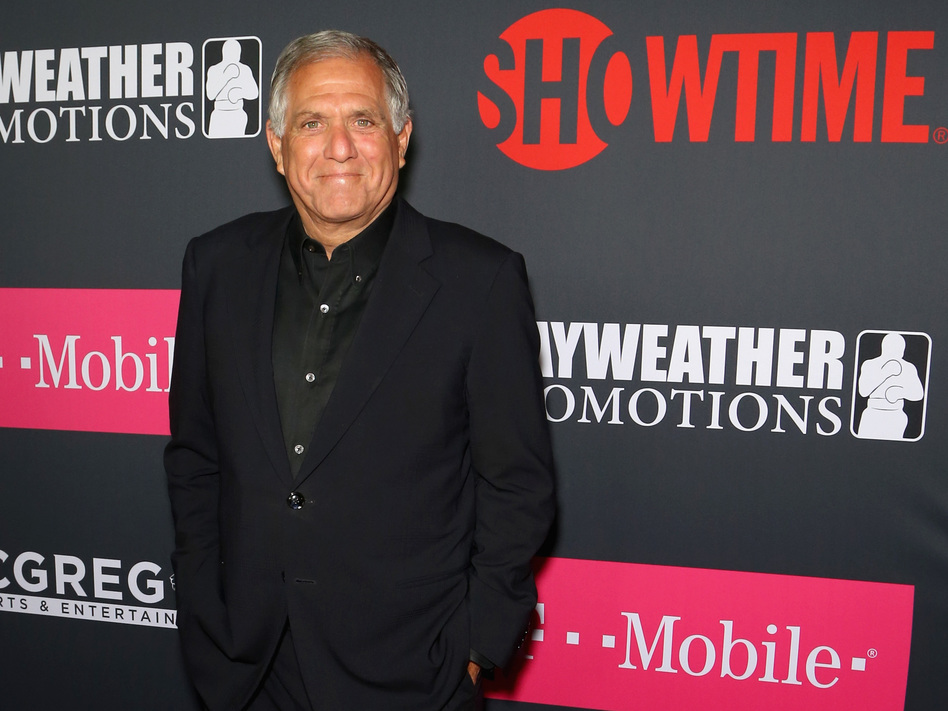
“He refused to take ‘no’ for an answer.”
That comment, offered in praise of Les Moonves for the pivotal role the chairman and CEO of CBS Corporation played in helping make the May 2, 2015, megafight pairing Floyd Mayweather Jr. and Manny Pacquiao, has taken on a more sordid connotation in light of the avalanche of accusations of sexual impropriety that have thrust the 68-year-old Moonves into the unwelcome company of such accused high-visibility miscreants as Bill Cosby, Harvey Weinstein, Charlie Rose, Bill O’Reilly and Matt Lauer.
But while the other aforementioned power players have been fired or indicted, their reputations in tatters, Moonves remains on the job as one of the most influential and highest paid (a reported $70 million in 2017) media executives in the United States. Despite a damning article authored by Ronan Farrow in The New Yorker that details numerous instances of bad behavior ranging from merely dubious to criminally actionable, and to which Moonves himself has admitted to some extent, CBS on Monday issued a statement of support that seemed to catch the editors of Variety somewhat off-guard. The entertainment publication’s opening paragraph reads thusly: “In a surprise move, CBS’ board of directors is keeping Leslie Moonves as chairman-CEO even as it launches a probe of sexual assault allegations leveled against him by six women in a New Yorker expose.”
Why should still another story of alleged sexual misconduct by an older man seeking to exert improper control over younger women be of any significance to a fight audience? Well, normally it wouldn’t, except for Moonves’ position, which includes a say in the direction of Showtime’s increasingly important boxing operation if he so chooses. When negotiations for Mayweather-Pacquiao, a pay-per-view event which was to be co-produced by Showtime and HBO, hit a snag, Moonves insinuated himself into the discussion because it made financial and logistic sense for him to do so. CBS/Showtime had entered into a six-bout, $250 million deal with Mayweather, and three of the four fights held to that point had underperformed. Subsequently, the prevailing belief in CBS/Showtime’s executive offices was that Mayweather’s long-delayed showdown with Pacquiao was not only advisable, but absolutely necessary to stanch the flow of red ink.
“Without Les Moonves, this fight wouldn’t have had a prayer of happening,” Top Rank chairman and CEO Bob Arum, a longtime friend of Moonves, said after the last “i” had been dotted and the last “t” crossed. “The real hero in getting this done is Les Moonves.”
And this from Stephen Espinoza, Showtime Sports’ executive vice president and general manager, tossing another verbal bouquet to his boss: “One of the main reasons this deal got done, when maybe other ones didn’t, was having Les Moonves as part of the process. He was deeply committed to making this deal. He is someone that all parties in this negotiation respected. He was really the catalyst for seeing this through. He refused to take `no’ for an answer from any side. He was there making sure that the parties came together in a successful and cooperative manner.”
But while the high-level wheeling and dealing to finalize Mayweather-Pacquiao was done behind closed doors, so too were those instances when Moonves was attempting to arrange a private deal with a female subordinate whose career he could either advance or stymie. One such occasion allegedly involved writer-actress Ileana Douglas, who was summoned to Moonves’ office to discuss matters involving a television project in which she was to have starred. The New Yorker story quotes Douglas’ heightening discomfort as Moonves made coarse and physical advances toward her.
“At that point, you’re a trapped animal,” Douglas said of the incident. “Your life is flashing before your eyes. It has stayed with me the rest of my life, that terror.”
After The New Yorker story came out, Moonves apologized, sort of, to the six women who told Farrow that the CBS bigwig had sexually harassed them. All claimed he became cold and hostile after they rejected his advances, and that they believed their careers suffered as a result.
In a statement, Moonves said, “Throughout my time at CBS, we have promoted a culture of respect and opportunity for all employees, and have consistently found success elevating women to top executive positions across our company. I recognize that there were times decades ago when I may have made some women uncomfortable by making advances. Those were mistakes and I regret them immensely. But I always understood and respected – and abided by the principle – that `no’ means `no,’ and I have never misused my position to harm or hinder anyone’s career … We at CBS are committed to being part of the solution.”
What makes the furor that has suddenly swirled up around Moonves all the more curious is his prominent support for the #MeToo movement and other feminist causes. In December, he helped found the Commission on Eliminating Sexual Harassment and Advancing Equality in the Workplace. A month prior to that, at a conference in November, he said, “I think it’s important that a company’s culture will not allow for (sexual harassment). And that’s the thing that’s far-reaching. There’s a lot we’re learning. There’s a lot we didn’t know.”
There’s a lot we didn’t know? Oh, for sure. We didn’t know for a very long time that TV’s favorite father figure, now-81-year-old Bill Cosby, would be classified as a sexually violent predator by a Pennsylvania court. Cosby is due to be sentenced Sept. 24 on three counts of aggravated indecent assault, and his alma mater, Temple University, rescinded the honorary Ph.D. it conferred upon him in 1991. The Cos resigned his spot on Temple’s Board of Trustees in 2014, after 32 years, amid accusations that he sexually assaulted dozens of women over decades.
We also didn’t know that Harvey Weinstein, 66, the co-founder of Miramax, would be dismissed from the company and be expelled from the Academy of Motion Picture Arts and Sciences after the New York Times ran a story on Oct, 5, 2017, detailing decades of allegations against him by over 80 women. It would seem that the most important piece of furniture in Weinstein’s office was not his desk, but the proverbial casting couch.
One of the more intriguing developments in the widening scandal involved TV newsmen Bill O’Reilly and Matt Lauer. In September 2017, O’Reilly, fired by Fox News for a series of alleged sexual improprieties, appeared as a guest on NBC’s Today show, where he told host Matt Lauer that his dismissal was “a hit job – a political and financial hit job.” Two months later, Lauer was canned by NBCUniversal after it was found he had an inappropriate sexual relationship with another much more junior NBC employee. Three additional women subsequently made complaints against Lauer.
Boxing is a physical sport, maybe the most physical there is, and in most cases the transgressions committed were by fighters who resorted to brute force, the fastest way to bring cops and attorneys into the equation. Think Tony Ayala Jr. spending 17 years behind bars for rape, a conviction that came on the heels of a previous incident in which he broke a teenage girl’s jaw after he made unwanted advances toward her in the restroom of a drive-in theater. But it might be argued that those who seek to have their way with women by exercising a different kind of power are just as much or even more reprehensible, an affront not only to the females they view as disposable objects but to any man who would not want to see his mother, wife or daughter treated so shabbily.
According to CBS, there have been no misconduct claims and no settlements against Moonves during his 24 years at the network. He deserves, as everyone does under the American system of jurisprudence, the presumption of innocence. But given the current landscape befouled by others who apparently felt that they could do whatever they wanted because they always had gotten away with it, sticking with the status quo might send the wrong message.
Check out more boxing news on video at The Boxing Channel
-
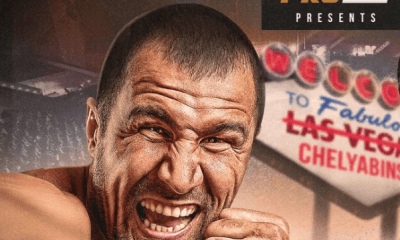
 Featured Articles4 weeks ago
Featured Articles4 weeks ago‘Krusher’ Kovalev Exits on a Winning Note: TKOs Artur Mann in his ‘Farewell Fight’
-
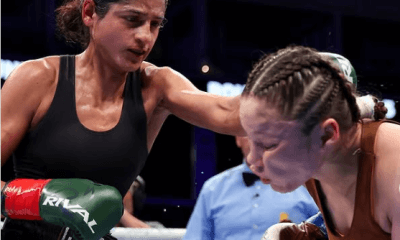
 Featured Articles4 weeks ago
Featured Articles4 weeks agoGabriela Fundora KOs Marilyn Badillo and Perez Upsets Conwell in Oceanside
-

 Featured Articles4 weeks ago
Featured Articles4 weeks agoFloyd Mayweather has Another Phenom and his name is Curmel Moton
-
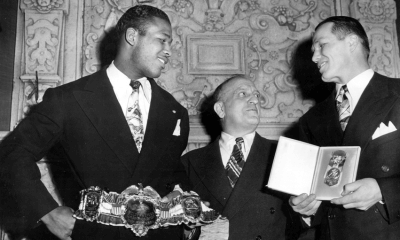
 Featured Articles4 weeks ago
Featured Articles4 weeks agoArne’s Almanac: The First Boxing Writers Assoc. of America Dinner Was Quite the Shindig
-

 Featured Articles3 weeks ago
Featured Articles3 weeks agoAvila Perspective, Chap. 323: Benn vs Eubank Family Feud and More
-
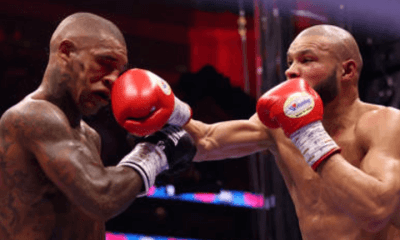
 Featured Articles3 weeks ago
Featured Articles3 weeks agoChris Eubank Jr Outlasts Conor Benn at Tottenham Hotspur Stadium
-
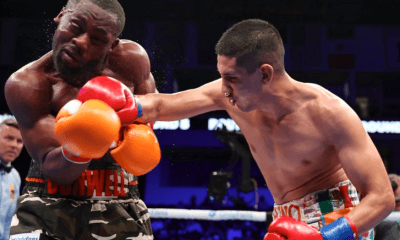
 Featured Articles3 weeks ago
Featured Articles3 weeks agoJorge Garcia is the TSS Fighter of the Month for April
-
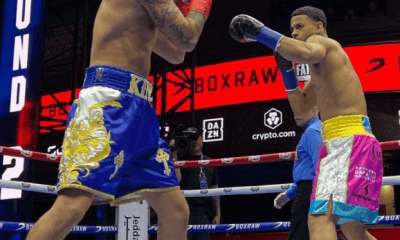
 Featured Articles2 weeks ago
Featured Articles2 weeks agoRolly Romero Upsets Ryan Garcia in the Finale of a Times Square Tripleheader

















